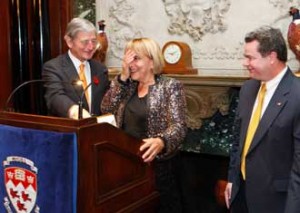
British author takes top honours for revealing history book
By Pascal Zamprelli
“This book represents my wanting us to grasp the full truthfulness of what occurred,” said British historian Lisa Jardine of her work, Going Dutch: How England Plundered Holland’s Glory (Harper), which was named the 2009 winner of the Cundill International Prize in History on Monday.
Going Dutch chronicles the remarkable relationship between the Dutch Republic and Britain, two of 17th Century Europe’s most important colonial powers, and sheds new light on the events that took place before and during the so-called Glorious Revolution of 1688.
The announcement was made before a crowd gathered at the Faculty Club by Dean of Arts and Cundill Jury Administrative Chair Christopher Manfredi, who was seated next to Jardine and the two other finalists: Pulitzer Prize-winning American author David Hackett Fischer, nominated for his book Champlain’s Dream; and Pekka Hämäläinen, a Finnish-born professor of Native American history whose book The Comanche Empire made the short list.
About 140 books were considered by the jury, which then whittled them down to a long list of ten, then to the short list. Hackett Fischer and Hämäläinen each garnered a “Recognition of Excellence” prize worth $10,000, while Jardine earned $75,000, making the Cundill Prize the largest non-fiction historical literature prize in the world.
In her ground-breaking book, Jardine assembles new research in political and social history, covering everything from science to gardening, to show how Dutch tolerance, resourcefulness and commercial acumen had effectively pervaded Britain long before 1688, thus challenging the traditional view that the rise of England as a world power took place at the expense of the Dutch, and offering evidence that the British were in fact conquered.
The conditions at the time, as well as the way events have been treated by historians, have “made it possible for those who had been conquered to believe they hadn’t been,” Jardine said, noting that her ideas proved difficult for many Brits to accept. But her mission, she said, “is to confront history and tell the truth about it. We can’t afford to sentimentalize or tip-toe around things to suit us and fit the current framework, otherwise we will misrepresent the present, and plan poorly for the future.”
The purpose of the Cundill Prize, established by McGill alumnus and renowned investment manager F. Peter Cundill and only in its second year, is to encourage the writing of history for a general audience. The three finalists engaged in a panel discussion on that very subject following the announcement.
Hackett Fischer noted that the message he gets from his readers, while they may be members of the general public, is that “they don’t want their history to be dumbed down.”
Jardine agreed, adding that “there is nothing too difficult to communicate to a general audience, as long as they don’t know it’s difficult.” In a sense, she continued, “we are inviting people to challenge us.” In her mind, that was the ties that bound all ten finalists on the long list: “all issued that challenge.”
In what will be an annual tradition, the discussion was followed by a lecture from Stuart B. Schwartz, winner of the inaugural Cundill Prize last year for his book All Can Be Saved: Religious Tolerance and Salvation in the Iberian Atlantic World. A year from now, McGill will welcome Jardine back to deliver a lecture as the 2010 winner is announced.
For more information go to www.mcgill.ca/cundillprize
